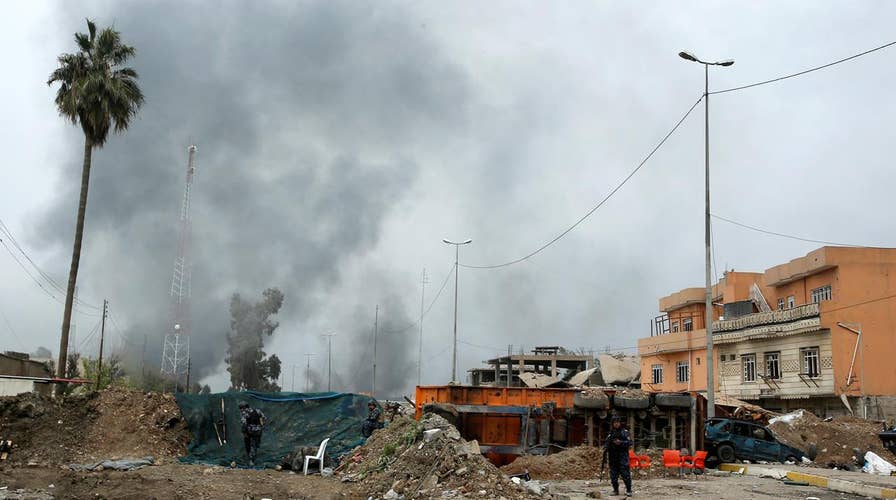Will ISIS militants leave Iraq for other terror hotspots?
As Iraqi security forces close in on the Islamic State in Mosul, concern where extremists will head next. Chris Snyder reports
Iraqi Prime Minister Hayder al-Abadi said on March 14, “The battle now is in the final stages. They are cornered, and if they will not surrender they will definitely get killed.” But the fight for the remainder of the city of Mosul will certainly be a hard-fought one. While Prime Minister Abadi’s confidence about the outcome is warranted and the ISIS fighters have nowhere to go, the most dangerous animal is one that is backed into a corner.
LONDON TERROR ATTACK: KILLER IDENTIFIED AS 52-YEAR-OLD KHALID MASOOD
But what will be the broader repercussions of Mosul’s liberation for the Islamic State of Iraq and the Levant (ISIL, more widely recognized as ISIS)? As mentioned in a previous OpsLens article, ISIS will revert back to its roots.
Back to Insurgency
On the tactical level, ISIS will have to devolve into an insurgency, leaving civilians extraordinarily vulnerable. They will increase suicide bombings on soft targets. They will attack pilgrims, funeral processions, the government, and infrastructure in an attempt to remain relevant.
Unfortunately, ISIS’ leaders will feel comfortable with this battle rhythm adjustment. Many of them started as insurgents. These are terrorists, nothing else. They lack clear religious ties and legal tenants and are loosely connected only in their common goal to create a caliphate and ultimately cause the domination of the world’s religion with their perverted version of Islam.
UK PARLIAMENT ATTACK IS THE LATEST TERROR SCARE FOR LONDON
The fighters of ISIS are a conflagration of differing motives, driving forces, and allegiances. The one common thread is hatred for the U.S., the Christian religion, and all those who do not see Islam as they do. They kill those whom they call infidels and Muslims alike. There is no real direction. They seem to be bent on destruction for destruction’s sake. They are the very definition of terrorism. Under the banner of predecessor groups such as Al Qaeda in Iraq (AQI) and the Islamic State of Iraq, they attempt to establish legitimacy.
The Insurgent Raises His Head
As it became apparent that ISIS would inevitably lose its grip on the main territories in Iraq and Syria, a devastating car bomb in the Shia-dominated Karada district of Baghdad killed more than 200 civilians. The bombing, which was the deadliest explosion in Baghdad since 2003, was followed closely by a triple suicide attack at a Shia holy site in Balad. On February 24, ISIS fighters were pushed out of Al Bab, their last stronghold in northern Syria. The following day, two suicide bombings claimed 53 lives.
More from OpsLens.com
The move to insurgency makes the political track more valuable than ever, as ISIS seeks to hide within the population. “We rely on the people to billet us,” as the Northern Irish nationalist Gerry Adams once put it. ISIS is relying on the same principle.
Other Countries Push ISIS Up Against a Wall
With the successful eviction of ISIS from Sirte in Libya, authorities must expect an increased infiltration of Tripoli and other major cities by ISIS sleeper cells. Regardless of the victories over ISIS, the drivers for radicalization and recruitment—the raison d’etre—are still there. It is in the brutalizing combination of immense poverty and political party grievances where ISIS finds allies.
The Next Battleground for ISIS
The defeat of ISIS in Mosul has a critical effect on Syria. ISIS is squeezed between Turkish-backed and Kurdish forces. The battle for Raqqa in Syria, ISIS’ last stronghold, has entered the endgame portion of the fight.
The Kurdish-backed Syrian Democratic Forces have positioned forces in surrounding villages and cut the supply road to Deir Az-Zor, with the aim of isolating and besieging the ISIS stronghold from all sides. Furthermore, the United States commitment is to serve as a buffer between various rebel factions and to provide weapons, advisors, and air and artillery support. These moves by the U.S. are having a major effect.









































